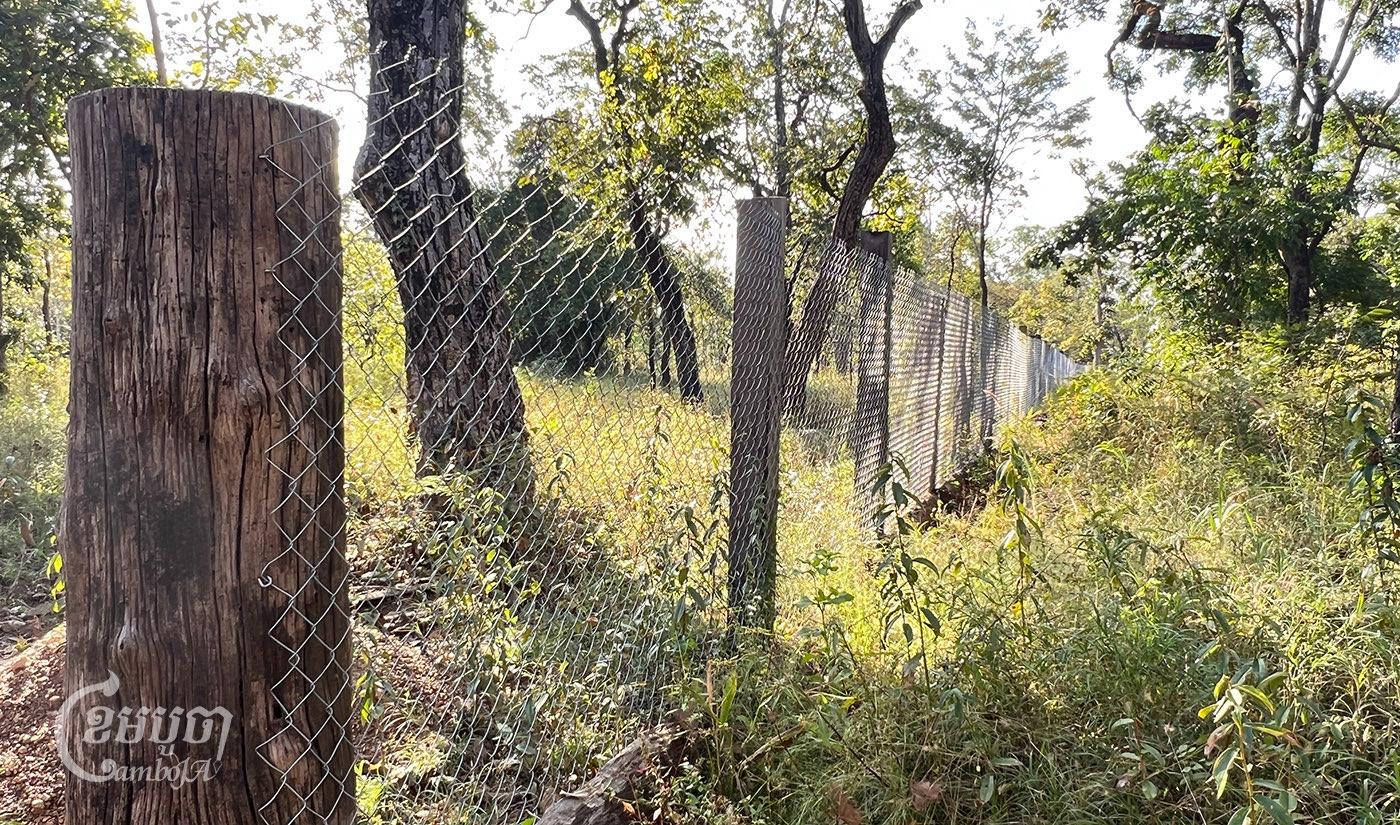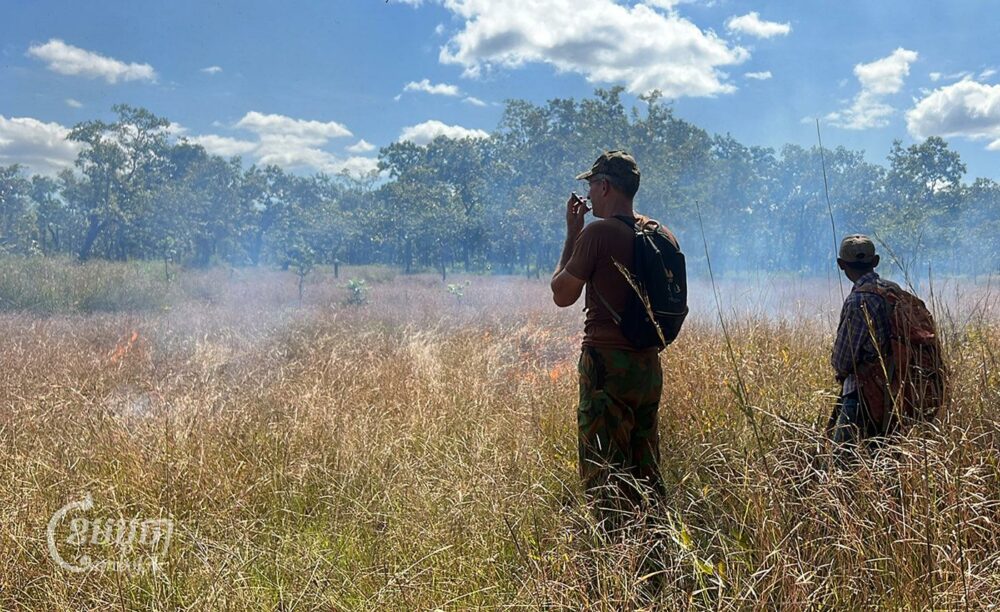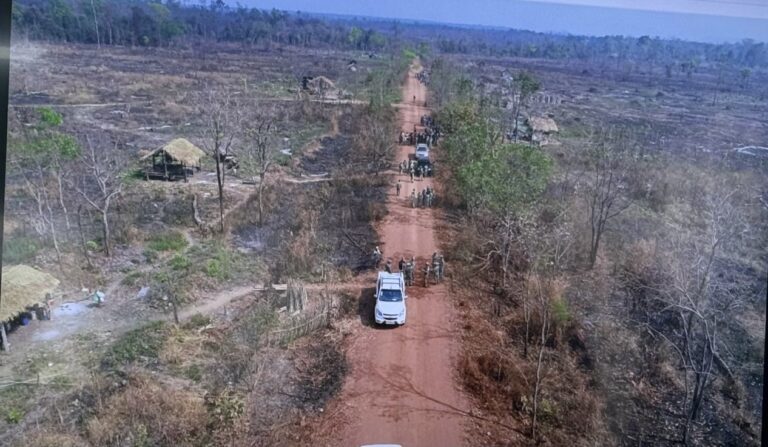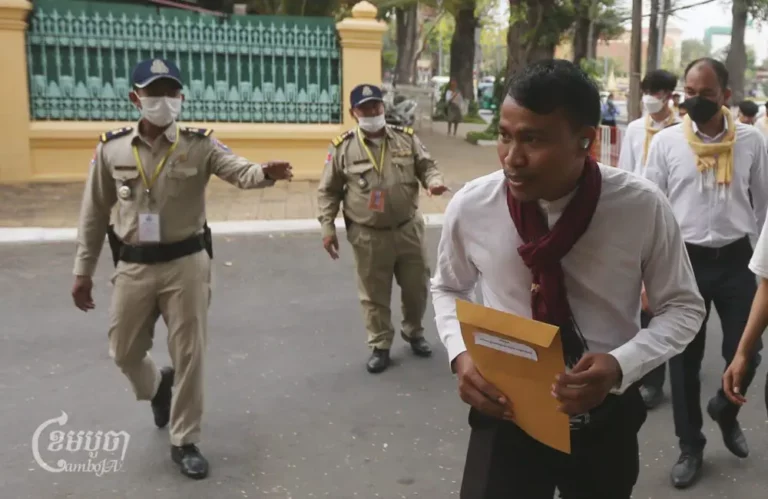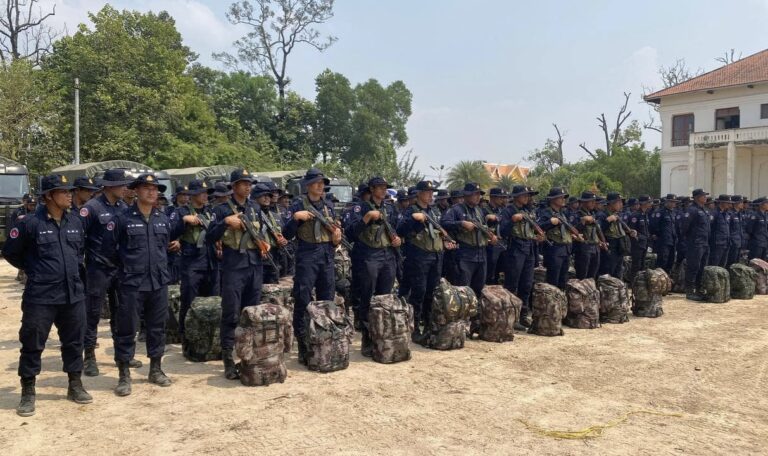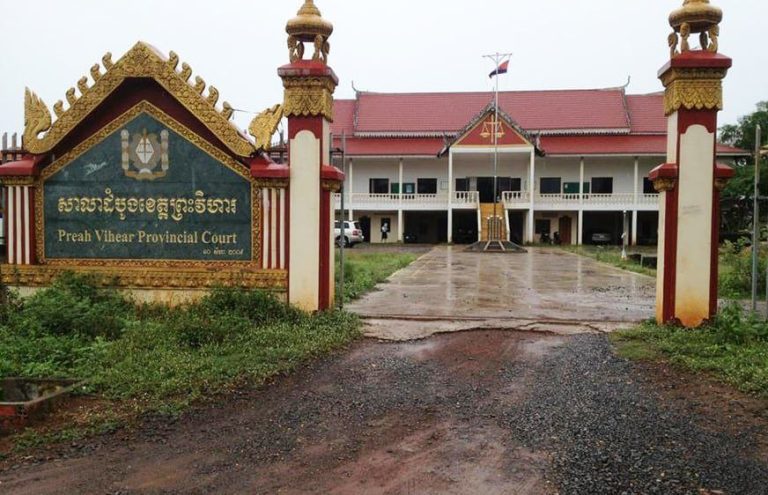A man in camouflage pants and a shirt labeled “U.S. Army” lunges at a villager, swinging a rattan stick in his right hand, handcuffs in his left. The shaky phone video, repackaged by an online news outlet and viewed some 1.7 million times on Facebook, captured a conflict between Angkrong village residents and a group of military police and workers employed by a conservation NGO in Preah Vihear’s Phnom Thnout-Phnom Pok Wildlife Sanctuary.
As the man with the stick, named Nop Thet, and a handful of colleagues try to force residents to move away from a confiscated tractor in the middle of the road, a villager shouts back: “We are Khmer. What nationality are you? Why don’t you understand us?”
BeTreed Adventures, an ecotourism business registered in 2015, has been praised for both its idyllic vacation property and conservation endeavors, and American co-founder Ben Davis was recently granted Cambodian citizenship and funding to support his work. But residents in two neighboring villages say they’re constrained by the restrictions set by the militarized forest guard – at a time when another conservation project in Cambodia is under increased scrutiny for alleged human rights abuses.
BeTreed Beginnings
Davis, originally from the United States, came to Cambodia in 1992 after volunteering to support Cambodians and Vietnamese in a refugee camp on Thailand’s border, amid Cambodia’s civil war post-Khmer Rouge regime.
“It felt like the people were really needy and desperate and I could make a difference,” he says.
He started off focused on building wells in Cambodia, and worked for the Adventist Development and Relief Agency for about 20 years before he shifted toward conservation in 2011. He says he was reacting to the government’s widespread campaign of economic land concessions, handing over massive tracts of land to private, often foreign companies on decades-long leases.
Davis says he came to an “informal agreement” with the Ministry of Agriculture, Forestry and Fisheries and Preah Vihear’s governor around 2012, in which he would be able to run a homestay in Phnom Thnout-Phnom Pok and protect the forest.
Monkeys, peacocks and boars wander around the homestay property like something out of a storybook. There’s a magpie named Maggie, who collects treasures and all things blue, and an ape called Molly with a proclivity for dipping her hands into food containers left unattended. Davis lives on the property with his wife and younger daughter, while the older child is off at college in Australia.
Outside this mythic space, Davis and his team – two staffers plus 10 to 15 paid community members – set camera traps, patrol the forest and dig a two-and-a-half-meter deep trench around a core protected area, which Davis describes as an attempt to keep wildlife in and poachers out.
“For years, we dreamed about finding a spot of untouched forest to preserve and protect,” BeTreed’s website reads. “People just needed to do something… why not us?”
Key team members in Davis’ conservation efforts are military police officers, who patrol the area, detaining those who they suspect to be committing crimes. In the years before Davis had military officers on his side, he says the patrols were ineffective, as suspected poachers and loggers could easily flee from his community rangers, working for a daily stipend of 30,000 riel, or $7.35.
“If they get back to the village, they’re free, they’re at home base, you can’t touch them,” Davis recalled.
Davis says the patrols changed in 2017, when the land became a wildlife sanctuary under the Environment Ministry’s control. Local authorities had previously instructed Davis to only detain people if his team could catch them in the act of breaking the law, but the Environment Ministry did not require this.
“It makes every sense to go and ambush them when they’re not expecting you,” Davis says he was told by the ministry. “But the villagers don’t see it that way. They still like the old system…The local authorities prefer the easy method where they mostly get away and we hardly catch them.”
In 2018, Davis also got access to military police working with Wildlife Alliance, a Cambodia-based conservation NGO currently under scrutiny for its allegedly abusive treatment of residents in and around the protected areas under its programs. Wildlife Alliance has a memorandum of understanding with the Environment Ministry to work with military police, and that agreement allows for the officers to be redirected to work with BeTreed, according to Preah Vihear spokesperson Nob Vuthy.
Wildlife Alliance did not respond to requests for comment, and CamboJA News was unable to review the memorandum of understanding. Environment Ministry spokesperson Khvay Atitya did not provide CamboJA News with a copy of the agreement or respond to questions in time for publication.
So far Davis has worked with about 50 military police officers, about three at a time rotating in and out every few months. The officers earn payments every month from Wildlife Alliance, plus monthly funding of about $100 per officer to cover food and travel provided by Our Future Organization, a Cambodian NGO which took over BeTreed’s conservation projects when it was established in 2019. Davis serves as a board member at the organization.
Meas Nhem, deputy director of the environment department in Preah Vihear, says Wildlife Alliance can seek support from the forestry administration and environment officers because it has a good relationship with the government.
“Suwanna [Guantlett], the head of Wildlife Alliance, has good cooperations with the government and BeTreed, so the teams have joined together to ban and crack down on forest crimes,” he says.
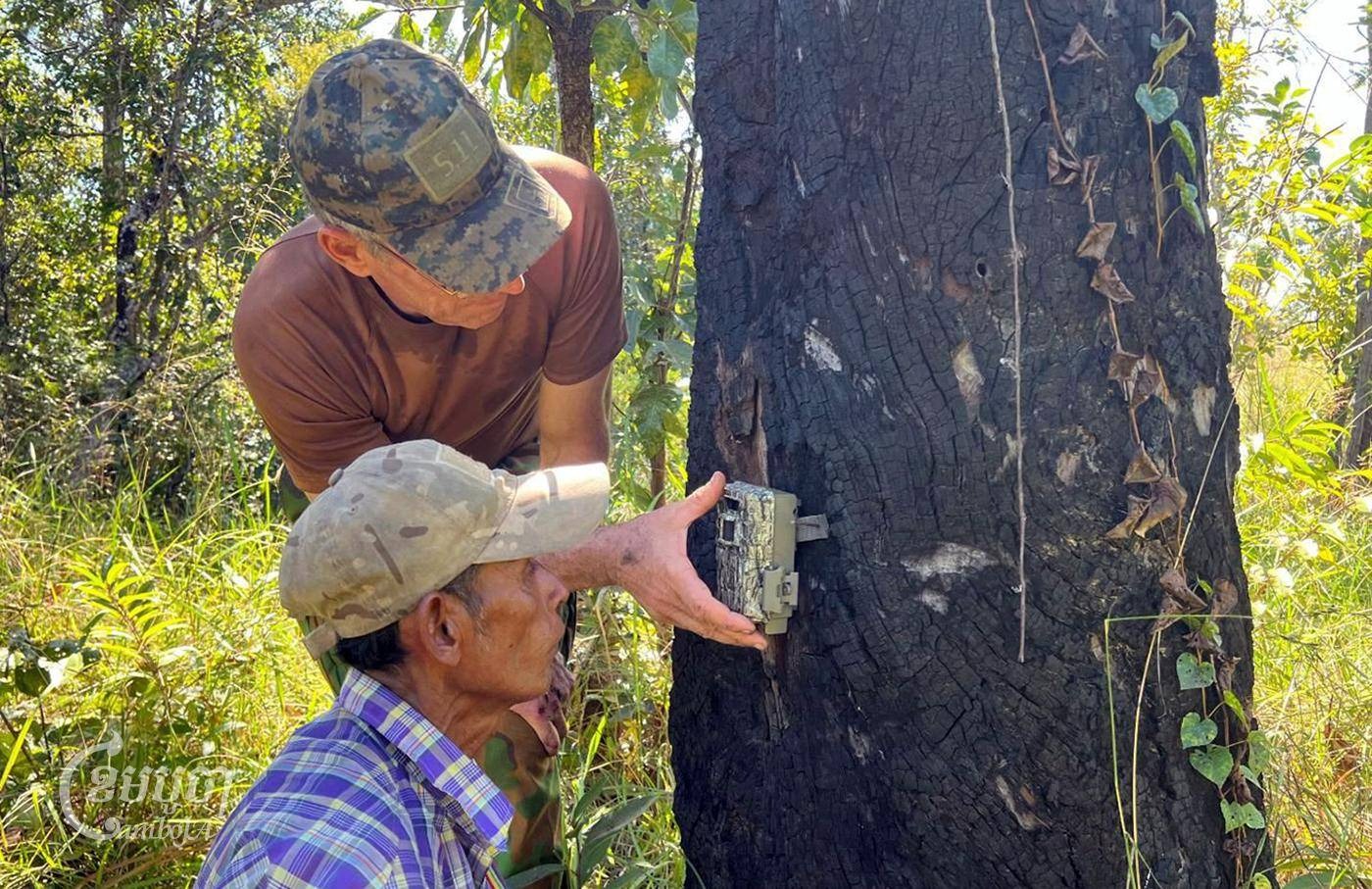
Two November Disputes
Two conflicts between residents and Davis’ team occurred within three weeks in November, heightening tensions between those who strictly try to protect Phnom Thnout-Phnom Pok and others who have lived inside and alongside it.
On November 7, Davis’s team arrested Chak Bo, a resident of Ta Bos village in Sangkum Thmei district, after they saw Bo setting snares in the grass inside the protected area, according to Davis.
Davis claims his team couldn’t catch him, so they went to Bo’s farm and asked him to show where he hid traps. Bo initially denied knowing, but then showed the officers the location of 15 snares, leading Davis to call the Environment Department who instructed the military officers to arrest Bo. In a video provided to CamboJA News by Davis, a handcuffed Bo admits to setting a snare.
Preah Vihear court spokesperson Chum Kanniya did not answer multiple phone calls to request comment on Bo’s case.
Davis felt the arrest was warranted. “Surely they know this guy is a habitual poacher,” he says of Ta Bos residents. But after the arrest one Facebook user posted a video, reporting their frustration with Bo’s arrest and saying it was no different than the French colonial era.
Pich Chan, the Tabos village chief and Bo’s brother-in-law, says he felt Davis overstepped his position and didn’t work with himself and other local officials.
“He doesn’t value local authorities, just goes to the provincial authorities,” Chan says. “I’m happy to help Ben [Davis], but I don’t want to see villagers here arrested.”
Then, on November 24, military police and rangers clashed with residents of Angkrong village, another village near Phnom Thnout-Phnom Pok, after detaining one man named Youen Yourn and confiscating his tractor for allegedly cutting down trees in the protected area.
CamboJA News was unable to contact Yourn, but another resident visible in online videos of the conflict, Chin Chhim, 46, says that he came to aid Yourn because he felt the military police were wrong to arrest him and take his tractor.
“We clashed, not violently, [we] just demanded the return of the stuff because the arrest did not have enough evidence,” he says.
Though he was happy the military police would protect the forest from logging, Chhim felt they didn’t sufficiently demarcate the protected zone and also had been too harsh on residents, who wouldn’t cut the trees, instead just harvesting some plants and fungi.
Davis says he was shocked that the conflict drew residents together against his team, saying he believed Yourn to be an outsider to Angkrong coming from Siem Reap.
“These local villagers here, why are they sticking up for these people from Siem Reap?” he asked.
He says he has witnessed tycoons pay people to sit on a piece of land so they can clear and claim it as their own, adding he thinks Yourn was doing the same.
As for why Thet, a non-military community ranger, was holding handcuffs in the Angkrong tractor incident, Davis says only one military officer was available that day and his team was outnumbered.
“If there was any chance of arresting anyone else it would be imperative that the community rangers help the military police as his weapon could easily be snatched away by the mob,” he wrote in a Telegram message.
The rangers were “trying to fend the mob off by threatening but they never actually hit any one,” Davis says. In another video posted on Facebook from the incident, Thet is seen swinging a knife at a villager after someone grabs his stick out of his hand.
While Davis does not condone violence or “unnecessary force” in the way he approaches conservation, he stated that “I myself have been chased by hunters many times and would have been amply justified in hitting back had it not been futile.”
Chhim, for his part, hopes one day Davis’ team would “get rid of the oppression from the rangers.”
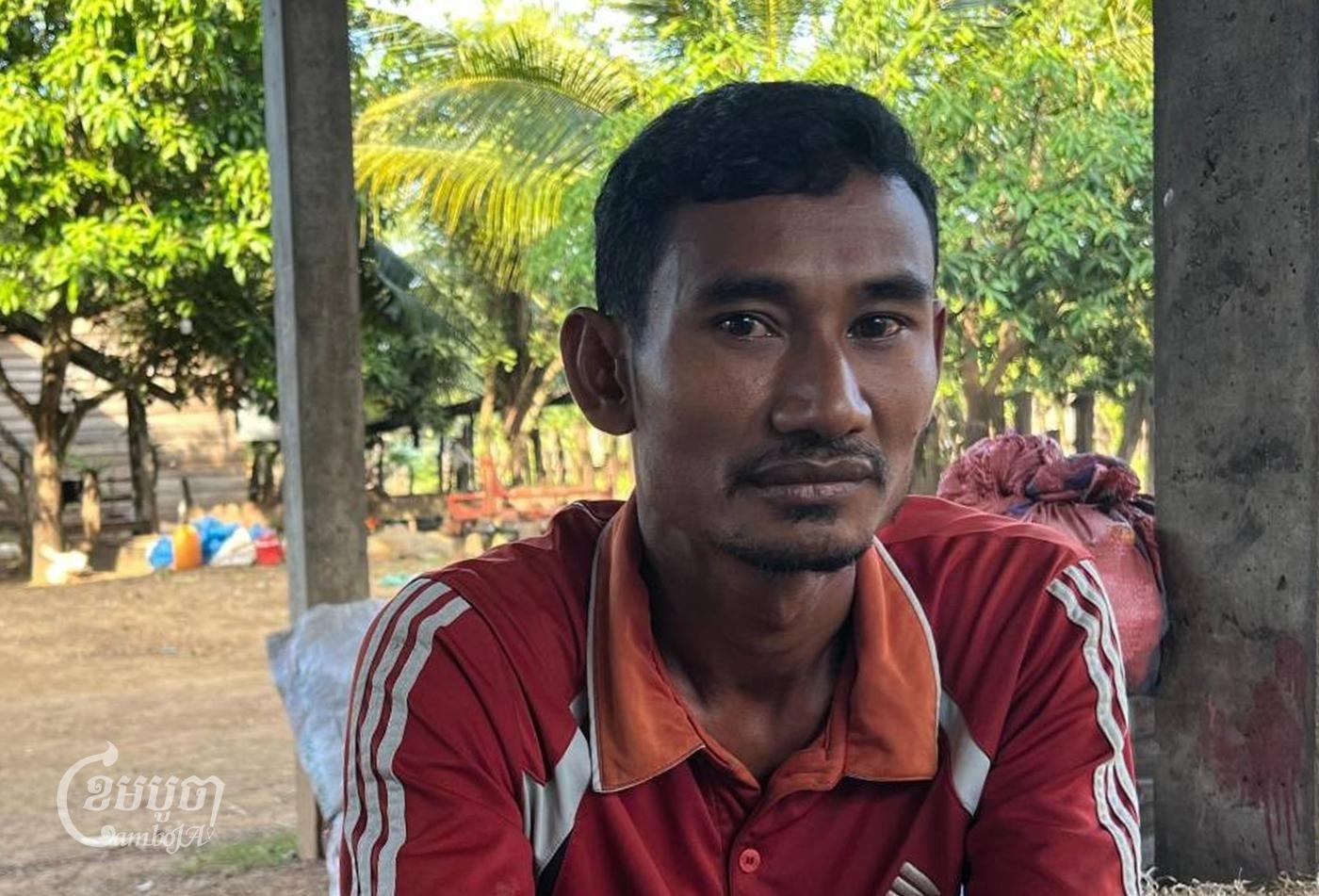
Media Criticisms
The two incidents made it into online outlets TKT News and IPN Watch, and Davis took issue with the way the outlets characterized the incidents, claiming both times his fleet of military officers and rangers were trying to protect the forest.
But he’s also been upset with international perceptions of their partner NGO Wildlife Alliance, which has been accused of abusing residents in and around the Cardamom National Park where it runs a carbon emissions offset program.
Verra, the international accreditation agency that tries to assure companies are investing in projects that truly offset carbon at their proposed rate, began investigating Wildlife Alliance after viewing the preliminary findings of an investigation by the NGO Human Rights Watch. CamboJA News has covered violence and home burnings carried out by Wildlife Alliance team members in another project in Pursat province. Wildlife Alliance denied using abusive patrolling tactics and claimed patrols only dismantled huts and tents.
Thet, the community ranger filmed swinging a stick and a knife, has previously worked for Wildlife Alliance. He was sued by Pursat villagers in March and named in complaints for allegedly being involved in burning down homes and illegally taking property. The lawsuit was later dropped. Thet did not respond to requests for comment.
Davis says his military rangers told him they burned down huts while working with Wildlife Alliance in Koh Kong province, but claimed they had justification to do so and did not burn very many huts. “The villagers then take that and make it sound like it’s human rights abuse,” Davis says.
According to Davis, he’s been told by the military officers who worked with Wildlife Alliance that he’s “way more strict” on the people.
While Davis believes some journalists covering conservation in Cambodia are well intentioned, he thinks some haven’t done enough research. He says he has a different perspective after living in Cambodia for 30 years compared to newcomers who “haven’t actually lived out in the jungle with the villagers.”
“The [media’s] idea is that Indigenous people are just honest humble little farmers,” he says. “Just because they’re Indigenous doesn’t mean they’re automatically all straight and don’t know how to lie.”
Davis feels for residents who take from the forest to a degree, noting that he hates arresting people he knows are under pressure to pay back microfinance loans. He blames the institutions for “taking advantage” of Cambodian citizens.
“But you can’t just say, okay, because they’ve got into this situation, we’re going to just let them destroy the whole jungle and all the environment. It just doesn’t make sense,” he says.
Sarah Milne, a professor of environmental management at Australian National University whose research focuses on Cambodia, explained that foreign-backed conservation projects, no matter how well-intentioned, will always be an extension of the current political scenario: in Cambodia’s case, pitching the poor against the rich and elite, with conservation efforts unable to avoid supporting some level of injustice.
“It’s really hard to sit with the truth and the fact that as a foreigner, you have very little control over what happens in Cambodia,” she says.
She sympathizes with Davis and similar projects that set out to protect the forest, but says no conservation group has ever survived trying to tackle illicit extraction by elites. For those employing military police, powerless villagers are always the easy target, she says.
“[Villagers] are out there digging out the tree roots and clearing it. But they’re not getting the land,” she says. “So you can go and arrest them, but if you don’t actually deal with the higher patron that’s orchestrating it, then you can’t really change the situation.”
When CamboJA News reporters visited Ta Bos and Angkrong villages in December, residents said they struggled to continue their lives when they couldn’t easily access the forest under Davis’ watch.
Pich Yoeut, the 36-year-old wife of the man arrested by Davis’ team for allegedly setting traps, says her husband Bo’s detention set them back greatly. He remains in jail, and their daughter wants to drop out of 11th grade because the family has lost income.
“I want to live like in the past, before Ben [Davis] arrived. I could go into the forest to find mushrooms, cut resin, find vines and find forest palm trees,” says Yoeut, of Ta Bos village. “Life is poor because I can’t find anything today to pay for the bank plus the daily expenses and school fees.”
Pin Hoy, a 34-year-old Angkrong resident who was involved in the confrontation over a tractor, says she is even more hesitant to collect mushrooms from the forest out of fear of the military police. Now she has a new fear: how to survive without as much income.
“Although we want to expand our farmland, we don’t dare do that because we are afraid of being caught,” she says. “We want him [Davis] to be more open because we live under pressure everyday. No one is happy.”
